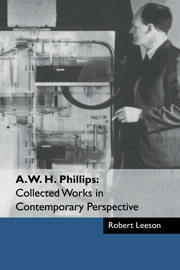Book contents
- Frontmatter
- Contents
- List of contributors
- Foreword by Arthur Brown
- Preface by Robert Leeson
- Part I Bill Phillips: Some Memories and Reflections
- Part II The Phillips Machine
- Part III Dynamic Stabilisation
- 15 The optimal control articles
- 16 Stabilisation policy in a closed economy
- 17 Stabilisation policy and the time-forms of lagged responses
- 18 Arnold Tustin's The Mechanism of Economic Systems: a review
- 19 Michel Kalecki's Theory of Economic Dynamics: An Essay on Cyclical and Long-Run Changes in the Capitalist Economy: a review
- 20 The growth articles
- 21 A simple model of employment, money and prices in a growing economy
- 22 Employment, inflation and growth
- 23 Economic policy and development
- 24 The famous Phillips Curve article
- 25 The relation between unemployment and the rate of change of money wage rates in the United Kingdom, 1861-1957
- 26 Discussion of Dicks-Mireaux and Dow's The Determinants of Wage Inflation: United Kingdom, 1946-1956
- 27 The Melbourne paper
- 28 Wage changes and unemployment in Australia, 1947-1958
- 29 Phillips and stabilisation policy as a threat to stability
- 30 The Phillips Curve in macroeconomics and econometrics
- 31 Bill Phillips' contribution to dynamic stabilisation policy
- 32 A Left Keynesian view of the Phillips Curve trade-off
- 33 Interactions with a fellow research engineer-economist
- 34 Does modern econometrics replicate the Phillips Curve?
- 35 The famous Phillips Curve article: a note on its publication
- Part IV Econometrics
- References
- Index of names
- Index of subjects
25 - The relation between unemployment and the rate of change of money wage rates in the United Kingdom, 1861-1957
Published online by Cambridge University Press: 04 May 2010
- Frontmatter
- Contents
- List of contributors
- Foreword by Arthur Brown
- Preface by Robert Leeson
- Part I Bill Phillips: Some Memories and Reflections
- Part II The Phillips Machine
- Part III Dynamic Stabilisation
- 15 The optimal control articles
- 16 Stabilisation policy in a closed economy
- 17 Stabilisation policy and the time-forms of lagged responses
- 18 Arnold Tustin's The Mechanism of Economic Systems: a review
- 19 Michel Kalecki's Theory of Economic Dynamics: An Essay on Cyclical and Long-Run Changes in the Capitalist Economy: a review
- 20 The growth articles
- 21 A simple model of employment, money and prices in a growing economy
- 22 Employment, inflation and growth
- 23 Economic policy and development
- 24 The famous Phillips Curve article
- 25 The relation between unemployment and the rate of change of money wage rates in the United Kingdom, 1861-1957
- 26 Discussion of Dicks-Mireaux and Dow's The Determinants of Wage Inflation: United Kingdom, 1946-1956
- 27 The Melbourne paper
- 28 Wage changes and unemployment in Australia, 1947-1958
- 29 Phillips and stabilisation policy as a threat to stability
- 30 The Phillips Curve in macroeconomics and econometrics
- 31 Bill Phillips' contribution to dynamic stabilisation policy
- 32 A Left Keynesian view of the Phillips Curve trade-off
- 33 Interactions with a fellow research engineer-economist
- 34 Does modern econometrics replicate the Phillips Curve?
- 35 The famous Phillips Curve article: a note on its publication
- Part IV Econometrics
- References
- Index of names
- Index of subjects
Summary
Hypothesis
When the demand for a commodity or service is high relatively to the supply of it we expect the price to rise, the rate of rise being greater the greater the excess demand. Conversely when the demand is low relatively to the supply we expect the price to fall, the rate of fall being greater the greater the deficiency of demand. It seems plausible that this principle should operate as one of the factors determining the rate of change of money wage rates, which are the price of labour services. When the demand for labour is high and there are very few unemployed we should expect employers to bid wage rates up quite rapidly, each firm and each industry being continually tempted to offer little above the prevailing rates to attract the most suitable labour from other firms and industries. On the other hand it appears that workers are reluctant to offer their services at less than the prevailing rates when the demand for labour is low and unemployment is high so that wage rates fall only very slowly. The relation between unemployment and the rate of change of wage rates is therefore likely to be highly non-linear.
It seems possible that a second factor influencing the rate of change of money wage rates might be the rate of change of the demand for labour, and so of unemployment. Thus in a year of rising business activity, with the demand for labour increasing and the percentage unemployment decreasing.
- Type
- Chapter
- Information
- A. W. H. Phillips: Collected Works in Contemporary Perspective , pp. 243 - 260Publisher: Cambridge University PressPrint publication year: 2000



